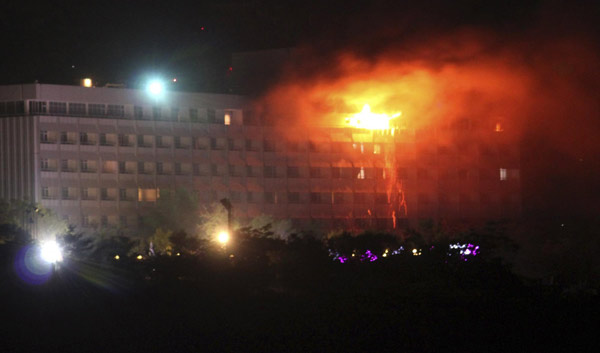NATO-Afghan raid ends hotel assault; 19 dead
 0 Comment(s)
0 Comment(s) Print
Print E-mail
China Daily via Agencies, June 30, 2011
E-mail
China Daily via Agencies, June 30, 2011
The first sign that militants were attacking one of Kabul's premiere hotels was an explosion that pierced Jawid's eardrums, prompting him to jump out the window of his room on the first floor into a chaotic scene that quickly turned into a grisly morass of bodies, gunfire and shattered glass.
 |
|
Smoke and flames rise from the Inter-Continental hotel during a battle between NATO-led forces and suicide bombers and Taliban insurgents in Kabul June 29, 2011. [Photo/Agencies] |
Nineteen people died - including all eight suicide bombers -- in a more than five-hour standoff at the Inter-Continental that ended early Wednesday after NATO attack helicopters fired missiles to kill three suicide bombers on the roof.
It was one of the biggest and most complex attacks orchestrated in the Afghan capital and appeared designed to show that the insurgents are capable of striking even in the center of power at a time when US officials are speaking of progress in the nearly 10-year war.
It started with one loud explosion at about 10 pm Tuesday, startling hotel guests, including Jawid, who uses only one name.
"There was smoke. People were running everywhere. There was shooting and crying," he said after escaping from the hotel grounds with his family. "The restaurant was full of guests."
The brazen attack occurred just a week after US President Barack Obama announced the beginning of a US troop withdrawal next month. The transfer of security responsibility to the Afghans is due to officially begin in seven areas of the nation, including most of Kabul province, in coming weeks.
"Where is the security in this country?" Jawid asked, shaking his head. "Where is the security in this hotel? When I got to the hotel, I had to go through three checkpoints. How did they enter?"
Militants, armed with explosive vests, anti-aircraft weapons and grenade launchers, launched the attack on the eve of a conference in the capital about transition plans.
Ashraf Ghani, chairman of the transition commission, was defiant as he opened the conference, which began Wednesday despite the bloodshed.
"The transition process will be done, and these coward enemies will not stop our plans," Ghani said.
Afghan President Hamid Karzai also vowed that his army and police would be ready to take over from foreign forces as planned, warning the militants are "enjoying the killing of innocent people."
"Such incidents will not stop us for transitioning security of our country" to Afghan forces, Karzai said in a statement.
US Rear Adm. Vic Beck, director of public relations for the international military coalition, said Afghan security forces responded quickly and professionally to the scene -- even though NATO helicopters were later called in to attack militants on the roof of the hotel. NATO said coalition mentors also were partnered with some of the units involved in the incident.
"This attack will do nothing to prevent the security transition process from moving forward," Beck said.
Security at the Inter-Continental and other key installations had been tightened for the conference and other official events taking place in the city. Officials said they were investigating how the insurgents were still able to get through and infiltrate the building, which is frequented by foreigners and dignitaries.





